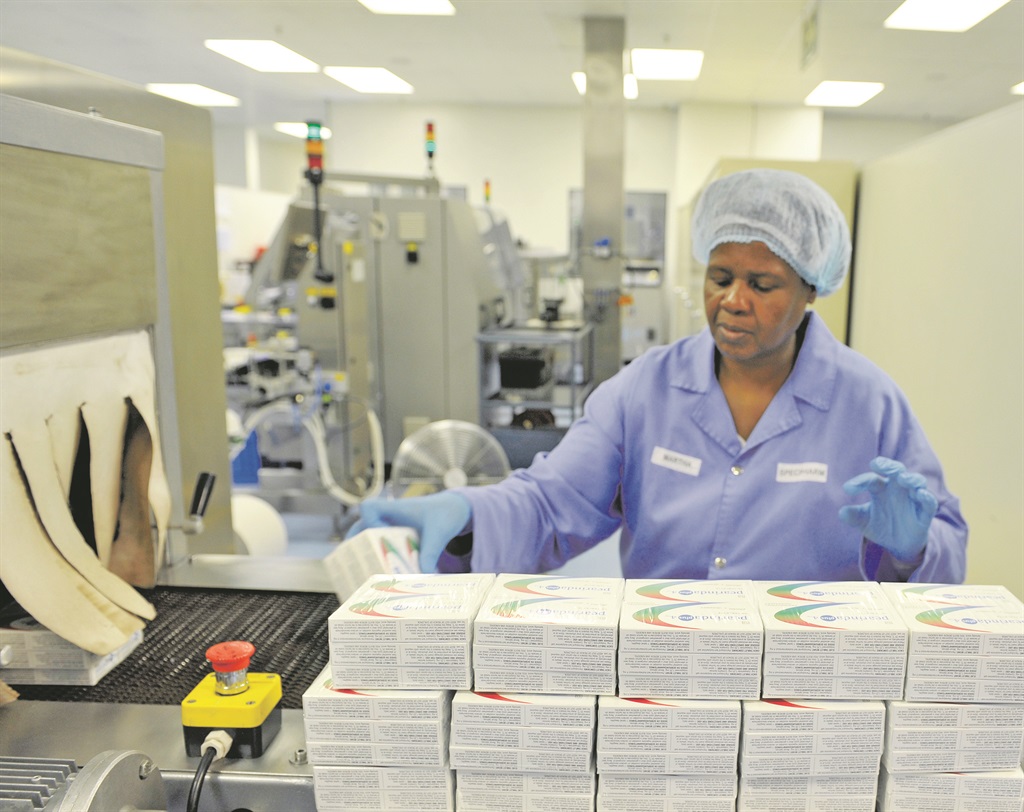
South Africa is in dire need of a steady supply of quality and affordable antiretroviral (ARV) drugs.
The country has the largest ARV programme in the world, with more than 3.6 million patients accessing the life-saving medication in the public healthcare sector alone.
This figure is expected to increase significantly by the end of this year as the government rolls out its test-and-treat campaign, which is likely to increase the patient load by up to a million people in the next few months.
But despite the enormous volumes of medication involved in its HIV-treatment programme, South Africa still relies on international pharmaceutical companies for the active components in the ARVs.
None of the local pharmaceutical companies that supplies the medication to public clinics and hospitals produces them.
Instead, they buy the ingredients that go into ARVs (called active pharmaceutical ingredients, or API) and formulate them into tablets, meaning the real winners are the international pharmaceutical companies.
However, that may soon change as a group of black pharmaceutical manufacturers are rallying together to change the status quo.
Specpharm, a black-owned pharmaceutical company employing 230 people – from packers to highly skilled chemical engineers – is one of those companies giving the medical playing field an overhaul.
Speaking to City Press this week, its managing director, Dr Eugene Lottering, said the idea of opening a local, active pharmaceutical ingredients manufacturing plant was long overdue.
“Antiretroviral drugs are the largest sold medicines in South Africa,” he said. “About 75% to 80% of the price of the ARV drug goes towards the purchasing of the active ingredient. This means that billions of rands leave this country to go to international pharmaceutical manufacturers.”
Currently, four local pharmaceutical companies – Sonke Pharmaceuticals, Mylan Pharmaceuticals, Aspen Pharma and Cipla Medpro – share the R14.2 billion ARV tender to supply drugs to public hospitals and clinics. All these companies import the active ingredients that go into the ARVs from India and China.
Lottering said the problem with this was that ARV prices changed whenever the rand weakened against the dollar.
“For example, if the exchange rate at the time of going to tender is R11 to the dollar and the exchange rate suddenly switches to R16 to the dollar, the price has to go up – otherwise we are not going to generate profit from selling it to government.
“The government would then be forced to pay local manufacturers more than was agreed when the tender was awarded.
“But if we make the active ingredients locally, those price changes that happen owing to importation are no longer a significant factor. The price remains stable and you have security of supply of the medication you want as a consumer,” he said.
Specpharm and other members of the Black Pharmaceutical Manufacturers’ Association (BPMA) have started to implement its plan to open an API plant.
They have been in talks with a German company that develops the technology needed to produce APIs.
Lottering said talks were at an advanced stage.
“We are looking at importing a technology called continuous manufacturing technology from Germany,” he said.
“The technology will enable us to compete with India and China. We are licensing it from Fluxpharm and we are in the last stages of finalising the licensing agreement.”
Lottering expected it to be finalised next month, paving the way for the BPMA to submit the proposal to the IDC for funding.
Bringing such technology into the country comes with a hefty price tag, something that the BPMA members cannot afford, and they have turned to the IDC to fund their venture. The IDC is now a 35% shareholder in Specpharm.
The IDC also has an interest in API manufacturing.
“The IDC is supportive of the idea. We are waiting for Specpharm to finalise their agreement with Fluxpharm so that we can consider the investment,” she said.
Lottering was hoping that the IDC would give them a chance.
“We are trying to solve a huge problem through this project. You can’t have the biggest ARV programme in the world with the active ingredient coming from international pharmaceutical producers, when we have the capability to make it locally,” he said.
He explained that the benefit of this would be great for South Africans.
“For example, if the government says there is a shortage of ARVs right now, it would take us at least two months to get the APIs imported and another month to formulate them into tablets. But if the APIs were manufactured locally, it would take us a few days to supply,” Lottering said.
Four years ago, the IDC joined a task team that formed Project Ketlaphela, which would have established the first pharmaceutical plant able to manufacture APIs in South Africa.
The in-progress project could be funded by a capital investment of up to R1 billion by various state institutions, including the IDC.
Sonia Keulder, head of chemical products and pharmaceuticals at the IDC, said they were looking forward to receiving the business proposal.
Lottering is not worried about how this would affect the Ketlaphela project. He said the BPMA had adopted an inclusive approach, rather than a competitive one.
“Ketlaphela is a state-owned company trying to do something in the private sector. We invited them to all the meetings we had with the technology distributors out of Germany to explain what the technology is about.
“We have support from them and they are interested in participating in it as well,” he said.




 Publications
Publications
 Partners
Partners








